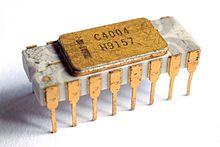Intel 4004

White ceramic Intel C4004 microprocessor with grey traces
|
|
| Produced | From late 1971 to 1981 |
|---|---|
| Common manufacturer(s) |
|
| Max. CPU clock rate | 740 kHz |
| Min. feature size | 10 μm |
| Instruction set | 4-bit BCD-oriented |
| Transistors | 2300 |
| Data width | 4 |
| Address width | 12 (multiplexed) |
| Successor |
Intel 4040 Intel 8008 |
| Application | Busicom calculator, arithmetic manipulation |
| Package(s) |
|
| Intel 4004 registers | ||||||||||||||||||||||||||||||||||||||||||||||||||||||||||||||||||||||||||||||||||||||||||||||||||||||||||||||||||||||||||||||||||||||||||||||||||||||||||||||||||||||||||||||||||||||||||||||||||||||||||||||||||||||||||||||||||||||||||||||||||||||||||||||||||||
|
||||||||||||||||||||||||||||||||||||||||||||||||||||||||||||||||||||||||||||||||||||||||||||||||||||||||||||||||||||||||||||||||||||||||||||||||||||||||||||||||||||||||||||||||||||||||||||||||||||||||||||||||||||||||||||||||||||||||||||||||||||||||||||||||||||
The Intel 4004 is a 4-bit central processing unit (CPU) released by Intel Corporation in 1971. It was the first commercially available microprocessor by Intel. The chip design started in April 1970, when Federico Faggin joined Intel, and it was completed under his leadership in January 1971. The first commercial sale of the fully operational 4004 occurred in March 1971 to Busicom Corp. of Japan for which it was originally designed and built as a custom chip. In mid-November of the same year, with the prophetic ad "Announcing a new era in integrated electronics", the 4004 was made commercially available to the general market. The 4004 is history’s first monolithic CPU, fully integrated in one small chip. Such a feat of integration was made possible by the use of the then-new silicon gate technology which allowed twice the number of random-logic transistors and an increase in speed by a factor of five compared to the incumbent technology. The 4004 microprocessor is one of 4 chips constituting the MCS-4 chip-set, which includes the 4001 ROM, 4002 RAM, and 4003 Shift Register. With these components, small computers with varying amounts of memory and I/O facilities can be built. Three other CPU chip designs were done at about the same time: the Four-Phase System AL1, done in 1969; the MP944, completed in 1970 and used in the F-14 Tomcat fighter jet; and the Texas Instruments TMS-0100 chip, announced in September 17, 1971. Both the AL1 and the MP944 use several chips for the implementation of the CPU function. The TMS0100 chip was presented as a “calculator on a chip” with the original designation TMS1802NC. This chip contains a very primitive CPU and can only be used to implement various simple 4-function calculators. It is the precursor of the TMS1000, introduced in 1974, which is considered the first microcontroller i.e., a computer on a chip containing not only the CPU, but also ROM, RAM, and I/O functions. The MCS-4 family of 4 chips developed by Intel, of which the 4004 is the CPU or microprocessor, is far more versatile and powerful than the single chip TMS1000, allowing the creation of a variety of small computers for various applications. The MCS-4 was eventually superseded by powerful microcontrollers like the Intel 8048 and the Zilog Z8 in 1978-1979. The architecture of this processor formed the basis for later models of microprocessors.
...
Wikipedia
